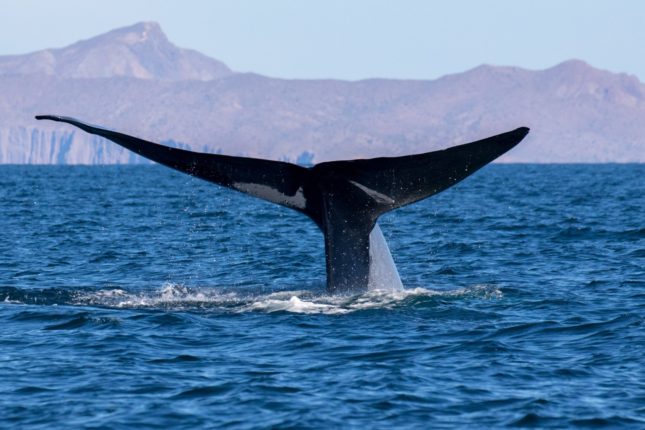
20 Must-Watch Vegan Documentaries That Will Change You For The Better
Documentaries are a powerful medium to promote the vegan lifestyle, animal rights and welfare, and awareness to a wider audience. However, some vegan documentaries do not just inform but inspire you to be a better version of yourself, to rethink the habits that have been instilled since childhood, and the importance of the vegan ideology for humanity’s existence.
Here are the summaries of 20 must-watch vegan documentaries that will certainly impact the way you think about what to buy and consume, all taken from a health, ethical, and environmental viewpoint.
1. From The Ground Up, 2017
Not to be confused with the political documentary of the same name, the film follows the former meat-eating college football player Santino Panico as he goes on a journey to bring back the athlete within—this time, as a vegan. Over the course of the documentary, Panico answers the question about how vegan athletes became world-class competitors in their fields.
From The Ground Up also highlights many eye-opening statistics. For example, the sheer amount of energy needed to raise ONE pound of chicken (520 gallons of water and 4.2 pounds of grain), pork (720 gallons of water and 11 pounds of grain) and beef meat (1,849 gallons of water and 32 pounds of grain) is absolutely staggering!
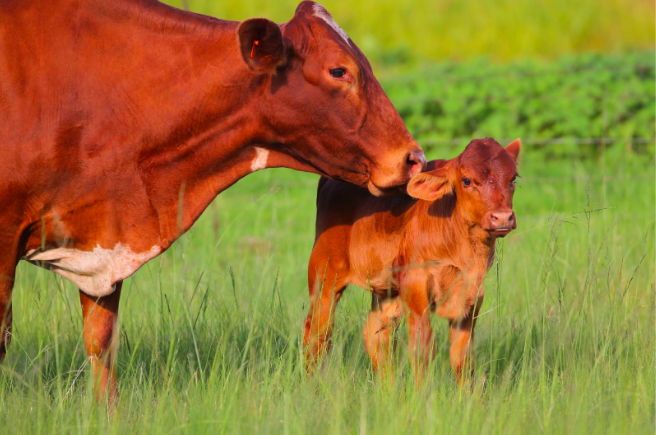
Here are more stats that the documentary brought up:
- In 2015, 2 billion animals were slaughtered in the United States alone, 99% of these animals came from factory farms.
- Processed meat is the most disease-causing food, followed by red meat, which is associated with chronic and heart diseases.
- 15% of all greenhouse gases are generated by the animal agriculture sector, heavily contributing to climate change and global warming.
2. What The Health, 2017
What The Health is primarily focused on human health. Kip Andersen and Keegan Kuhn interview medical doctors and researchers about the danger of consuming animal foods and how it is contributing to the rampancy of death-dealing diseases.
The ideas explored in this documentary are no laughing matter. The film delves into the ways that the big pharmaceutical business and food companies are cracking down on the truth. The film ends on a positive note, showing people whose lives took a complete 180 after embarking on a vegan journey.
Where What The Health (Slightly) Missed The Mark

While Andersen and Kuhn’s fervor in protecting animals is praiseworthy, there were also a number of informational blunders pointed out by experts. Here are some of them:
- The claim that eating one egg a day is similar to smoking five cigarettes is based on outdated research. Andy Bellati, a dietician who has followed the vegan diet for six years, stated: “Plant-based food can help decrease the risks for certain cancers. The idea that if you’re going to eat an egg you might as well smoke a Marlboro, I don’t find accurate.”
- Andersen is repeatedly overstating the role of food in driving diseases. One such example is him saying “five to 10 percent of cancer is caused by genetics, and the rest is caused by food.” Fixing our health woes is not just about eating healthier, although it is a BIG part of it. An estimate by the Centers for Disease Control and Prevention says we can prevent by up to 40% of the deaths caused by the five leading causes (cancer, heart disease, stroke, chronic lower respiratory diseases, unintentional injuries). by doing more physical activity, quitting smoking, avoiding dangerous sun exposure, cutting alcohol intake, AND improving our diet.
- Another claim made in the documentary (by Dr. Barnard) is that sugar does not cause diabetes, but meat does. However, that is not entirely true. Inflammation is found out to be the root of all diseases, and there is a strong link between excess sugar and refined carbohydrates to inflammation and diabetes. One such study determined that there is a 20 percent prevalence of Type 2 diabetes in countries with greater availability of high-fructose corn syrup, a man-made sugar commonly used in soft drinks and other products.
3. Forks Over Knives, 2011
Forks Over Knives follows American physician Caldwell Esselstyn and professor of nutritional biochemistry T. Colin Campbell, both with similar animal-farming backgrounds, but now advocating veganism.
The film admirably draws historical data and provides many statistics and research as it explores the food-as-medicine concept. The documentary indicates that as much as 80% of healthcare budget can be reduced simply by changing our eating habits.
Where Forks Over Knives (Slightly) Missed The Mark

- The film barely mentions Dr. Esselstyn’s program of almost completely eliminating ALL fat sources—not just animal fat sources, but also the elimination of plant fat sources such as nuts, avocados, legumes, etc. It would be particularly important for the audience to know about Esselstyn’s stand on this matter for the sake of full disclosure.
- The documentary suggests you can only eat one of two possible ways: a standard American diet or a plant-based diet. Its constant flip-flopping about what the definition of a Western diet is—from donuts and cake one moment and animal meat the next—can be confusing. It gives you the idea that a Western diet consists solely of meat while neglecting the fact that non-Western people like the Inuits, Masai, and Australian Aborigines are hunters-gatherers that incorporate a lot of meat in their diet as well.
- At around the 13-minute mark of the documentary, it is mentioned that dietary cholesterol tends to stay in the bloodstream. That obsolete information has been effectively debunked as of 2009. A Harvard study explains that, “The supposed link between dietary and serum cholesterol stems from studies that had fundamental design flaws, failed to separate the effects of cholesterol different types of fat intake, or were performed on animals that are obligate herbivores.”
4. Earthlings, 2005
The documentary is a thought-provoking, hard-to-watch-but-I’d-watch-nonetheless type of movie. It contains never-before-seen footage of farms brutally slaughtering animals. More importantly, it answers the question about the connection of worldwide power issues and animal suffering as it examines the industries that heavily rely on animals to make a profit. It is unsettling (many people did not make through the first 30 minutes of the 95-minute film) and yet very insightful.
It wouldn’t be your fault if you feel guilty about eating meat when you watch Earthlings, but it is more than a guilt-trip. It takes you on a global journey—from the leather industry in the Middle East to the circus and animal shelter industries anywhere—bringing to light the often hidden reality of animal cruelty in these businesses.
Where Earthlings (Slightly) Missed The Mark
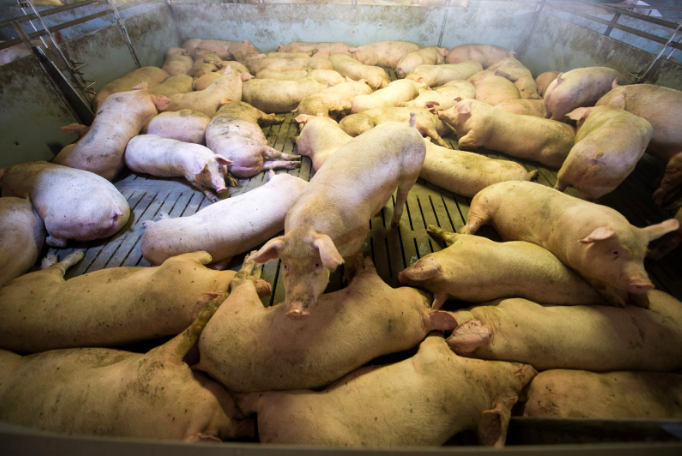
One claim made in the documentary is about Pfiesteria being caused directly by the mass consumption of animals. (Pfiesteria is a genus of heterotrophic dinoflagellates that have been proven to cause lesions among fish and can be harmful to humans as well.) But then later, it states that Pfiesteria came from gallons of hog urine and feces being poured into the oceans. If the latter is the case, then it could not be directly attributed to consumption of meat but to incorrect waste disposal.
5. Cowspiracy, 2014
Cowspiracy claims to have uncovered an immense conspiracy between governments and the world’s biggest environmental organizations to mislead the people about the principal cause of global warming. The film claims that the main cause of global warming is animal agriculture—not fossil fuels like coal, oil, and natural gas as experts tell us, and the only solution is for everyone to go vegan.
The film gives us the following statistical facts:
- 65% of all human-related emissions of nitrous oxide can be attributed to animal livestock. Nitrous oxide is a greenhouse gas with 296 times the global warming potential of carbon dioxide, and which stays in the atmosphere for 150 years.
- Livestock and byproducts account for >32,000MM tons of CO2 every year. That’s up to 51% of worldwide greenhouse gas emissions.
- Cows produce 150 billion gallons of methane per day and methane is more dangerous than carbon dioxide in terms of global warming potential in a 20-year frame.
- Every year, animal agriculture consumes 34-76 trillion gallons of water.
- Agriculture, in general, is accountable for up to 90% of water consumption in the United States and 56% of that number is for crops grown to feed livestock.
Where Cowspiracy (Slightly) Missed The Mark
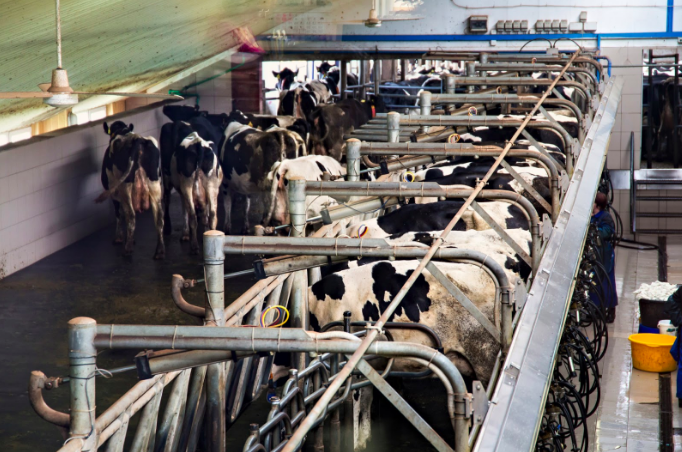
The most critical figure, or statistic, in the documentary (and also the most disputed), is the 51% highlighted in the second bullet. A blog published by global warming expert Doug Boucher in the Union of Concerned Scientists website contends that the 51% estimate is a gross inflation of known data by Jeff Anhang and the late Robert Goodland, the authors of the report that was used in the documentary.
6. Lucent, 2014
Lucent is a feature-length documentary that brings to light an important but largely ignored issue—animal abuse in the pig farming industry. The documentary is set in Australia, but the problem is prevalent worldwide.
The documentary highlights the problem with a combination of hidden and hand-held camera footage that shows daily cruelty is, unfortunately, the accepted practice in the industry. Lucent has proclaimed to have shed light on the darkness of Australian piggeries, and may have done that in quite an alarming way.
Where Lucent (Slightly) Missed The Mark
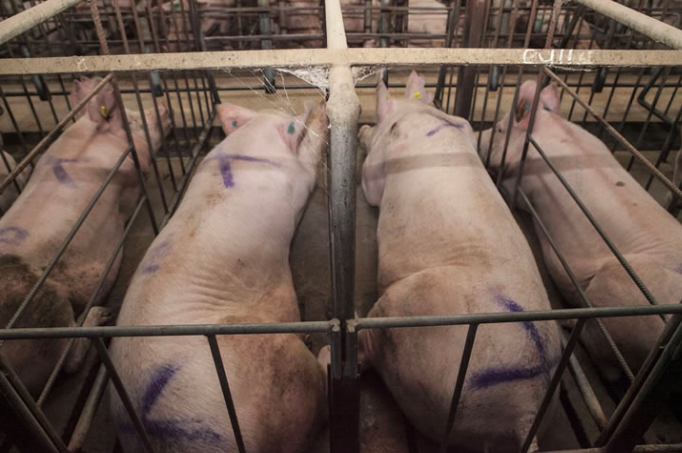
Lucent may have done a good job showing the elephant in the room but presenting us a solution? Not so much. Not once will you hear that going vegan is the solution nor he is adamant about ending animal cruelty.
It’s surprising that an animal rights activist like director Chris Delforce does not even mention once about veganism. With that, the question lingers in the viewers’ minds: What is the real purpose of the documentary?
7. Live and Let Live, 2013

Live and Let Live is a documentary that probes into the relationship between humans and animals and examines the ethical reasons why some people elected to stop eating animal meat altogether and go vegan.
The Marc Pierschel-directed film offers a variety of reasons to go vegan and does so in a calm, well-spoken, and less-combative manner that will not make any meat-eater feel attacked. The six people featured in the documentary came from different backgrounds—a restaurant owner who also happens to be a butcher, a dairy farmer, a young woman, a lawyer, and two activists—telling the story of how big an impact the decision to go vegan has made in their lives.
Where Live and Let Live (Slightly) Missed The Mark
Sometimes, it is better to leave to the viewers the weighing of the decision but it seems like Live and Let Live has already done it for you. While the views of the experts and vegans are well-appreciated, it would be nice to interview someone with a slightly conflicting view to get rid of that propagandist touch that so often engulfs these documentaries.
Also, the documentary spends more time delving into the ethical aspect of veganism while making less time for the more important health and environmental facets. If the latter issues were considered more, then it probably would have done a better job convincing non-vegans to at least consider the lifestyle.
8. Vegan: Everyday Stories, 2016
Vegan: Everyday Stories is a documentary that follows the pattern of featuring vegan people of different backgrounds. It uses the stories of Genesis Butler, Yassine Diboun, Renee King-Sonnen, and Jerri Hastey to weave a beautiful fabric that answers the question “Why Go Vegan?”
Non-vegans would truly appreciate the way it tackles the vegan lifestyle without being pushy. It simply presents these four people as very passionate about their lifestyle choice, making it very enjoyable and educational.
Where Vegan: Everyday Stories (Slightly) Missed The Mark
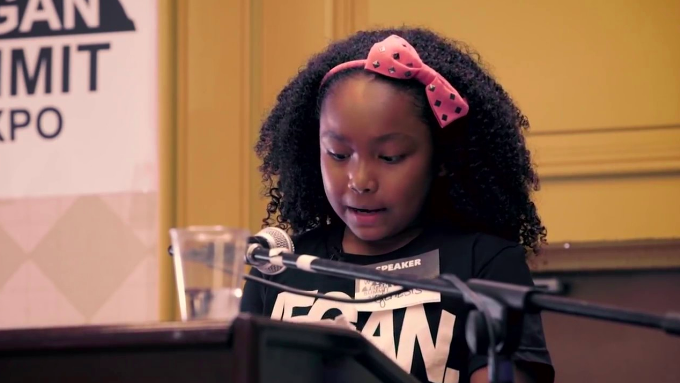
While the documentary is very educational, it seems like it takes up too much time on the four people. They could have included (or abbreviated) more information such as the effects of a plant-based diet on overall health and well-being as well as environmental and healthcare implications. It would also be appreciated if viewers can have a peek at what these vegans actually eat instead of focusing on a single scene that awkwardly lasts so long.
9. Dominion, 2018
Dominion is the newest documentary by Chris Delforce and narrated by actors Joaquin Phoenix (who also narrated Earthlings) and Rooney Mara. It has been described as “powerful” and “intense” by vegan activist James Aspey.
The documentary is sort of a sequel to Lucent. Unlike Lucent, which has its eyes set solely on the Australian pig farming industry, Dominion has a wider scope. It focuses on the abuse of meat animals in Australia, examining six primary angles of human interaction with animals—pets, wildlife, scientific research, entertainment, clothing, and food.
Where Dominion (Slightly) Missed The Mark
Dominion missed the mark entirely if you ask meat industry leaders in Australia. They believe the footage was covertly obtained and the documentary designed to damage the reputation of livestock farming.
The film isn’t representative of the wider industry, said Patrick Hutchinson, the chief executive of the Australian Meat Industry Council said. The majority of employees do their best to ensure the humane treatment of animals.
Even so, as Aspey said after watching the documentary:
“There is no right way to do the wrong thing. It’s not about finding nicer ways to do this – it’s about abolishing animal exploitation forever. The only way to do that is for consumers to stop creating demand. All animal products are the result of violence and exploitation.
10. Carnage, 2017
Carnage is a mockumentary set 50 years into the future where the whole of UK is vegan (and meat-eaters are now “carnists”. Dairy, meat, and eggs are outlawed and the animals roam free. It probably is the first vegan documentary made out to be a comedy and the director Simon Amstell successfully built a solid case to be vegan without being self-righteous.
The mockumentary is harmonized by interviews and a funny meeting where British elders talked about how mortified they were of their carnivorous past. Carnage doesn’t have disturbing scenes of animal abuse and does not continuously point fingers who’s head should be hanged next. Its lighthearted approach to veganism is no doubt exhilarating, and the best thing,if you’re Amstell on making this mockumentary, is that you don’t have to deal with harsh non-vegan critics about some statistical and informational mishaps. It’s a parody, after all, and one that we can all enjoy, vegan or otherwise.
11. Food Choices, 2016
Food Choices touches on three most important areas of our lives—health, environment, and animal ethics. The narrator and filmmaker Michal Siewierski talks about his quest to plant-based eating and how it made him realize the way it impacts not only his health but about the environment and others as well. Along the way, Siewierski interviewed a slew of experts, researchers, doctors, and other vegan people.
In a nutshell, the documentary did not pull any punches on animal protein. It points out that it raises cholesterol, stresses the kidneys, the liver, starts heart disease, and encourage the production of free radicals. All in all, Food Choices made valid points about saturated fat and the vegan diet as a possible solution to health problems.
Where Food Choices (Slightly) Missed The Mark
Registered Dietitian Morgan O’Neil disagrees with some points mentioned in the documentary. Here’s a rundown:
- Studies have shown that dietary cholesterol hardly plays a role in the development of cardiovascular diseases.
- Saturated fat, in healthy amounts, is needed for hormone regulation
- The animals people eat are not all vegetarians, as the documentary claims. Chickens, turkeys, and pigs eat some other animals if given the chance.
- Like many documentaries, Food Choices vilify eggs as food that contains too much cholesterol and should be avoided like the plague.
- Omega-3 fatty acids cause diabetes, according to Food Choices, but a study done by the Harvard School of Public Health indicates it can actually reduce the risk for Type 2 diabetes.
12. Called To Rescue, 2016
Called to Rescue is a beautiful documentary about rescued animals in 15 animal sanctuaries all over the United States. These rescued farm animals, just by simply being who they are, are changing the lives of everyone on both sides of the fence. Naomi, Loghan and Auston Call, the filmmakers and directors, beautifully captured (no pun intended) the joys that come from volunteering and administering at farm sanctuaries.
The documentary is one of those films you can’t find fault with. It is not graphic with videos and footages of animal cruelty but is positive and still educates the viewer about animal cruelty.
13. Super Size Me, 2004
Super Size Me is one of the oldest documentaries in this list but the simple message that it wants to get across is as timeless as they come: too much junk food and we all become junk ourselves!
Morgan Spurlock, the film’s writer and director, got the idea of the movie when he heard of two girls suing McDonald’s for making them obese. So Spurlock wanted to find out for himself by deciding to eat McDonald’s in a span of 30 days, from February 1 to March 2, 2003.
As it follows Spurlock’s “journey” to obesity, the documentary spits out some distressing facts:
- 1 in 4 Americans will have some fast food in one of their three meals of the day. That made the fast-food industry the 12-billion figure industry that it is today.
- No surprise, 60% of Americans right now can be considered overweight or obese
- Mississippi is the fattest State in America. It has an obesity rate of 34.4%.
- During that 30-day span, Spurlock gained 24 pounds, developed a fatty liver, increased uric acid levels in his blood, cholesterol went up 65 points, body fat percentage up 7%, and doubles his risk for coronary heart disease.
- Sometimes saying absolutely nothing is saying A LOT. McDonald’s did not deny the claim made in the documentary.
Where Super Size Me (Slightly) Missed The Mark
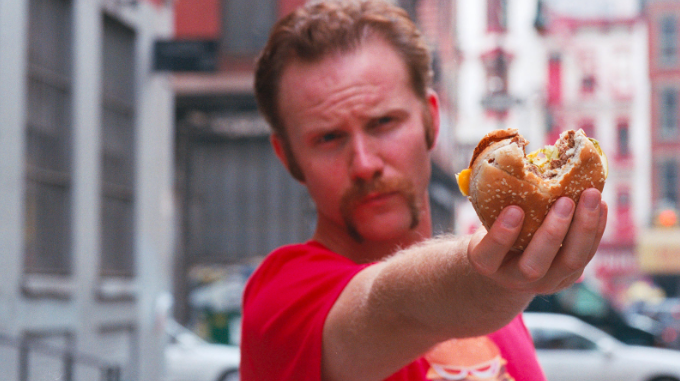
Obviously, Super Size Me has taken fast-food eating to an extreme. I mean, no person in the right mind would drink a gallon of soda and consume 5,000 calories a day like Spurlock did in normal circumstances. Even so, he helps us see an important point: Eating fast food does take a toll on your body.
14. The Game Changers, 2018
The Game Changers is a documentary that heavily features successful athletes and how a vegan diet propelled them to the pinnacle of sports success. These athletes include Dotsie Bausch, an Olympic silver medalist at 39 years of age, Patrik Baboumian, a weightlifter who once hoisted 1,213 pounds over his head, and the legendary ultramarathoner Scott Jurek.
Here are some facts from the documentary:
- Vitamin B-12 deficiencies are not for vegans only. Even meat-eaters have been found out to be low in B12.
- The narrator James Wilks, an MMA fighter and Special Forces trainer, says companies market meat the same way they do cigarettes. “[It’s] playing the same game,” Wilks says, “with a different product.” Big Macs became the Camels of the modern era, and athletes began to believe they needed to consume animal protein in order to be strong.”
- A plant-based diet reduces inflammation by nearly 30% in as little as 21 days.
- A plant-based diet could be the secret to strong athletic performances. The aforementioned Bausch compared her body to a machine when she went on an entirely vegan diet and Carl Lewis, a nine-time Olympic gold medalist, notes that his personal records were set when he was in his 30’s and on a plant-based diet.
Where The Game Changers (Slightly) Missed The Mark
If you’re an Average Joe trying to eat healthily, you may not relate to the documentary. While it does present solid arguments about a plant-based diet boosting athletic performance, many of us do not have such goals as running the Appalachian trail, competing in the Olympics, be the world’s strongest person, etc. And you will see a lot of James Wilks in the movie, which could be good or bad, depending on how you look at it.
15. The Cove, 2009
The Cove delves into dolphin hunting going on for years in Taiji, Japan and won an Oscar for it. The documentary is praised for its pulse-pounding theme but never straying away from its core message.
The whole dolphin mass-hunting is a well-kept secret that even most people in Japan don’t even know. It is heartbreaking, to say the least, seeing the plight of dolphins slaughtered (or more accurately speaking, harpooned) into the thousands for their meat. Yes, MEAT! Dolphin meat is laced with heavy doses of mercury but is mislabeled as “whale meat” and finds their way into schoolchildren’s lunchboxes.
Overall, the documentary will grip you in a way that probably no other environmentally-themed movie can. It’s not an easy film to watch because you realize soon enough that this horror is happening in real life and it shows just how evil a man can get.
Some facts mentioned in the movie:
- They call it “drive hunts” when dolphins and small porpoises rounded up by boats into a cove area where they are captured to be sold to marine parks or killed. Each year, this drive hunts take the lives of 20,000 dolphins, porpoises, and small whales.
- Ric O’Barry, one of the stars of the documentary, was part of the dolphin business himself as a trainer. He was involved in the Flipper TV series where he himself captured the 5 dolphins who collectively played Flipper and has a house in Taiji, Japan. After years of making money off the dolphins, Barry wanted to make amends and make the disruption of the dolphin round-up his mission.
- Taiji, Japan is regarded as the birthplace of whale hunting as the occupation can be traced into this town as far back as the 1600’s.
- Dolphin hunters can make up to $250,000 for every live dolphin they can capture. More often than not, these dolphins die of shock before they were sold to aquariums and marine parks.
16. The Ghosts In Our Machine, 2013
Animal rights activism is a subject that is easy to sympathize with, although animal rights activists themselves can be so aggressive with their methods. Filmmaker Liz Marshall avoids that problem with The Ghosts In Our Machine as it follows photographer Jo-Ann McArthur as she travels the world documenting the plight of animals worldwide with her camera. What she witnessed gave McArthur post-traumatic stress disorder.
That said, the movie will definitely appeal to people who want to understand what is going on in the world and why the aforementioned animal rights activists want to expose animal exploitation in hopes of stopping it altogether.
Where The Ghosts In Our Machine (Slightly) Missed The Mark
As great and touching The Ghosts In Our Machine is, it has its flaws. Many critics feel it raises more questions than providing the audience with clear-cut answers. Marshall actually addressed that issue, saying that it’s more important to get people thinking than stipulating the solutions.
At times, the documentary spits out interesting ideas that are not adequately developed. One such example is in the start of the film, where it says that the struggle for animal rights is the 21st Century equivalent to the struggle for civil rights in the 1960s. That argument can be compelling but it was not effectively refined.
There were also contradicting messages such as the notion that all animals should be granted rights equal to humans and that no being should be allowed to own another, including humans owning pets. In another scene, however, it mentions of the benefits to the animal rights movement that can come from humans owning animals.
17. Blackfish, 2013
Blackfish is about an Orca whale named Tilikum and its involvement in the death of three individuals. In that line of thought, the documentary explores the harm and danger of keeping killer whales in captivity and how Sea World supposedly spun the story by claiming these whales enjoy what they do.
Where Blackfish (Slightly) Missed The Mark
As expected Sea World, raises its objections to the facts presented by the documentary.
- Sea World does not starve any of the animals they have although they admitted that some parks use the starvation method.
- When Keltie Byrne slipped into the pool containing three orcas and when she was subsequently dragged and drowned, two of the killer whales were pregnant, which possibly explains their aggressive behavior. Ms. Byrne was a part-time employee at Sea World.
- The film, as it interviewed an EMT technician, suggested that Tilikum swallowed Dawn Brancheau’s arm during the attack. This is subsequently proven to be false.
- The unstated premise of the film—that it is safe to be in the water with any marine mammal—is not true. These 20-ton animals can be unpredictable and while it is obviously not right for them to be kept in pools, they can be very aggressive even when in their natural habitat.
18. Speciesism: The Movie, 2013
Speciesism: The Movie is done by Mark Devries, a college student at the time in 2013. The film is looking for answers to the question “Does an animal’s life has less value than human life?” and “Because we can control other beings, does that mean we should?”
The documentary also went on to interview such scholarly figures as Richard Dawkins, Gary Francione, and Temple Grandin, adding to the film’s credibility. It also explores the horrors of factory farming including the effects it has on the animals and the community. An interview about one hog farmer dying of cancer because of the poisonous wastes that come from these farms will surely tug at your heartstrings.
Where Speciesism: The Movie (Slightly) Missed The Mark
As great as the movie was, showed his inexperience when he failed to connect one idea from another, especially at the beginning of the film. The one scene where Devries films his own father talking about the excruciating pain that he suffers every day as the result of an accident that left his body permanently injured is an example of this. It could be an opportunity for him to build on the topic of pain and make a connection to what farm animals go through. That did not happen, though, and Devries went on with something else on the very next scene.
19. Eating You Alive, 2018
Eating You Alive is a documentary that evidently aims to educate viewers on the benefits of a plant-based diet. It features leading medical experts and researchers and takes a scientific look at the reasons why Americans are sicker despite the fact that we have more pills than ever before.
Some of the facts mentioned in the documentary:
- 70% of deaths in America is caused by chronic diseases
- It is notable that the nation spends $1.5 trillion in treating those illnesses alone
- Not eating enough fruits and vegetables will up the risk of chronic diseases in adults by as much as 90%, according to a new study.
- Red meat is linked to a 70% risk of colorectal cancer, according to this study.
Where Eating You Alive (Slightly) Missed The Mark
One quote in the documentary says that dairy is the largest trigger cancer. This is, in part, misleading as studies show that some type of cancer (such as colorectal cancer) can be prevented with ingredients found in dairy while some forms (like stomach cancer) have no adverse effects. There is a strong link, however, between consuming too much dairy and prostate cancer in men and breast cancer in women.
20. Fed Up, 2014
Fed Up is a documentary that has a simple but very important message: cut down on sugar. Filmmaker Stephanie Soechtig and journalist Katie Couric scrutinize the cause of the obesity epidemic in America. The documentary highlights the efforts of the food industry’s lobbying efforts and how it hides “sugar” in our food labels.
Some of the facts mentioned in the documentary:
- 93 million Americans are said to be affected by obesity
- A 20-ounce soda has approximately 17 teaspoons of sugar from high-fructose corn syrup
- Food companies “hide” sugar under a variety of names such as beet sugar, cane sugar, high fructose corn syrup, and dozens of others.
- 80% of all food products in America contains a form of sugar
- One in 5 black children between the ages of 2 and 19 is obese compared to one in 7 white children.
Where Fed Up (Slightly) Missed The Mark
The documentary claims that “more people will die from the effects of obesity than from starvation” this year, meaning in 2014. That is not true at all. The World Health Organization states that about 2.8 million die from being overweight and obese but experts placed hunger-related deaths in 2014 at 10 million.
Another claim made in the documentary is that Americans have doubled their sugar intake from 1977 to 2000. Again, it has been proven false according to per capita stats by the USDA ERS food availability data. Americans increased their sugar intake but not as significant as Fed Up claims.


